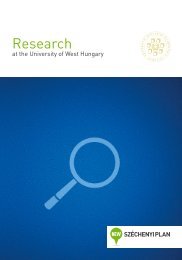Facskó Ferenc (szerk.) (2012): Kutatások a Nyugat-magyarországi
Facskó Ferenc (szerk.) (2012): Kutatások a Nyugat-magyarországi
Facskó Ferenc (szerk.) (2012): Kutatások a Nyugat-magyarországi
You also want an ePaper? Increase the reach of your titles
YUMPU automatically turns print PDFs into web optimized ePapers that Google loves.
141<br />
A szántóföldtől az asztalig<br />
biztosítja. Nem kellően tisztázott viszont, hogy az egyes termesztéstechnológiai elemek<br />
miként befolyásolják a fajták egyes mennyiségi és minőségi tulajdonságát.<br />
A fajtáink köztermesztésben vannak, illetve tarthatók. A különféle termesztéstechnológiai<br />
beavatkozások hatásainak elemzése azonban csak hosszabb távú kísérletsorozat elvégzését<br />
követően végezhető el az ökológiai, elsősorban meteorológiai tényezők változékonysága<br />
miatt az un. évhatás nagyon jelentős a kísérletek eredményeinek biometriai szerint<br />
Publikációk:<br />
KAJDI F. – KUROLI G. – NÉMETH L. – REISINGER P. – ÁRENDÁS T. – CSATHÓ P. – NÉMETH T. (2010):<br />
Tönköly. In. RADICS L. (<strong>szerk</strong>.) Fenntartható szemléletű szántóföldi növénytermesztéstan<br />
1. Agroinform, Budapest. P- 551-566.<br />
KAJDI F. (2011): Tarlórépa. In: IMREI F.: Répakönyv. Czupi Kiadó, Nagykanizsa. p. 29-42.<br />
ISBN 978-963-9782-18-1<br />
KAJDI F. (2011): A lóbab örökléstana és nemesítése. A lóbab. Magyarország kultúrfl órája.<br />
Szent István Egyetemi Kiadó. Gödöllő. 3(13) p. 112-121.<br />
KAJDI F. (2011): A lóbab fajtái. A lóbab. Magyarország kultúrfl órája. Szent István Egyetemi<br />
Kiadó. Gödöllő. 3(13) p. 134-143.<br />
ST., ŠILHÁR – F., KAJDI – A., SVĚTLÍKOVÁ – M., POLOVKA – R., SCHMIDT – P., SZAKÁL (2011):<br />
Utilization of regional sources for functional foods production. Acta Agronómica<br />
Óváriensis. 53, 1. különszám: p. 3-18.<br />
Abstract – The Slovak-Hungarian cross-border region is typical of its specifi c agricultural<br />
character and unique land quality, both from its composition and fertility point of view. Besides<br />
these positive aspects, the overproduction of agricultural and food products usually<br />
with low added value in the past decades has caused the problems with sales of products and<br />
has resulted in the worsen position of food producers in local as well as national or international<br />
food market. As an another consequence, the global retardation of the region takes<br />
place, resulting in the underdeveloped infrastructure, growing unemployment, as well as<br />
overall worsening of its socio-demographic structure.<br />
The main aim of the project is “Utilization of regional sources for functional food production”<br />
supported by the European Regional Development Fund within the Hungary – Slovakia<br />
cross-border cooperation programme 2007-2013 is therefore to set the scientifi c basis,<br />
objective criteria and optimized technological parameters for the development of an innovative<br />
food production strategy and technology in order to assure the production of foods<br />
from regional sources with higher added value for sellers and, last but not least, with modifi<br />
ed – improved functional properties with positive infl uence on human wellbeing.<br />
To meet these targets, the exact monitoring, study, analysis and modifi cation of both, growing<br />
conditions of selected plants/crops and their subsequent technological processing into<br />
semi-fi nished products utilized in food industry or fi nal food products is being performed, in<br />
order to achieve the food products with improved functional characteristics and increased<br />
antioxidant potential. At the same time, the project outputs will fi nd the direct application in<br />
practice, increasing the added value of food products, which in turn will lead to the anticipated<br />
increase in competitiveness, employment and infrastructure development of the regions.



